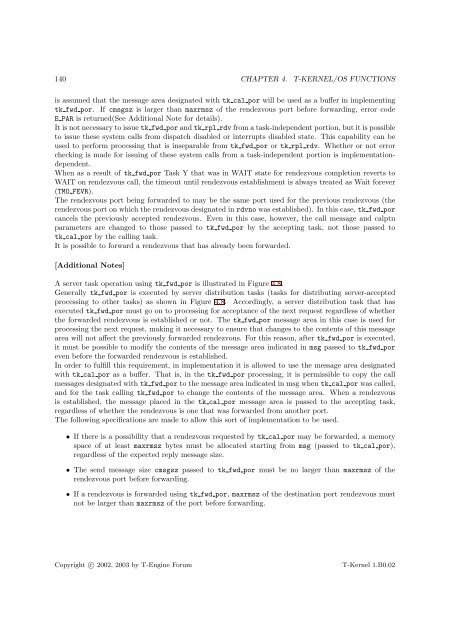T-Kernel Specification (1.B0.02)
T-Kernel Specification (1.B0.02)
T-Kernel Specification (1.B0.02)
Create successful ePaper yourself
Turn your PDF publications into a flip-book with our unique Google optimized e-Paper software.
140 CHAPTER 4. T-KERNEL/OS FUNCTIONS<br />
is assumed that the message area designated with tk cal por will be used as a buffer in implementing<br />
tk fwd por. If cmsgsz is larger than maxrmsz of the rendezvous port before forwarding, error code<br />
E PAR is returned(See Additional Note for details).<br />
It is not necessary to issue tk fwd por and tk rpl rdv from a task-independent portion, but it is possible<br />
to issue these system calls from dispatch disabled or interrupts disabled state. This capability can be<br />
used to perform processing that is inseparable from tk fwd por or tk rpl rdv. Whether or not error<br />
checking is made for issuing of these system calls from a task-independent portion is implementationdependent.<br />
When as a result of tk fwd por Task Y that was in WAIT state for rendezvous completion reverts to<br />
WAIT on rendezvous call, the timeout until rendezvous establishment is always treated as Wait forever<br />
(TMO FEVR).<br />
The rendezvous port being forwarded to may be the same port used for the previous rendezvous (the<br />
rendezvous port on which the rendezvous designated in rdvno was established). In this case, tk fwd por<br />
cancels the previously accepted rendezvous. Even in this case, however, the call message and calptn<br />
parameters are changed to those passed to tk fwd por by the accepting task, not those passed to<br />
tk cal por by the calling task.<br />
It is possible to forward a rendezvous that has already been forwarded.<br />
[Additional Notes]<br />
A server task operation using tk fwd por is illustrated in Figure 4.8.<br />
Generally tk fwd por is executed by server distribution tasks (tasks for distributing server-accepted<br />
processing to other tasks) as shown in Figure 4.8. Accordingly, a server distribution task that has<br />
executed tk fwd por must go on to processing for acceptance of the next request regardless of whether<br />
the forwarded rendezvous is established or not. The tk fwd por message area in this case is used for<br />
processing the next request, making it necessary to ensure that changes to the contents of this message<br />
area will not affect the previously forwarded rendezvous. For this reason, after tk fwd por is executed,<br />
it must be possible to modify the contents of the message area indicated in msg passed to tk fwd por<br />
even before the forwarded rendezvous is established.<br />
In order to fulfill this requirement, in implementation it is allowed to use the message area designated<br />
with tk cal por as a buffer. That is, in the tk fwd por processing, it is permissible to copy the call<br />
messages designated with tk fwd por to the message area indicated in msg when tk cal por was called,<br />
and for the task calling tk fwd por to change the contents of the message area. When a rendezvous<br />
is established, the message placed in the tk cal por message area is passed to the accepting task,<br />
regardless of whether the rendezvous is one that was forwarded from another port.<br />
The following specifications are made to allow this sort of implementation to be used.<br />
• If there is a possibility that a rendezvous requested by tk cal por may be forwarded, a memory<br />
space of at least maxrmsz bytes must be allocated starting from msg (passed to tk cal por),<br />
regardless of the expected reply message size.<br />
• The send message size cmsgsz passed to tk fwd por must be no larger than maxrmsz of the<br />
rendezvous port before forwarding.<br />
• If a rendezvous is forwarded using tk fwd por, maxrmsz of the destination port rendezvous must<br />
not be larger than maxrmsz of the port before forwarding.<br />
Copyright c○ 2002, 2003 by T-Engine Forum<br />
T-<strong>Kernel</strong> <strong>1.B0.02</strong>












![[8] 2002 e-business-strategies-for-virtual-organizations](https://img.yumpu.com/8167654/1/190x257/8-2002-e-business-strategies-for-virtual-organizations.jpg?quality=85)


